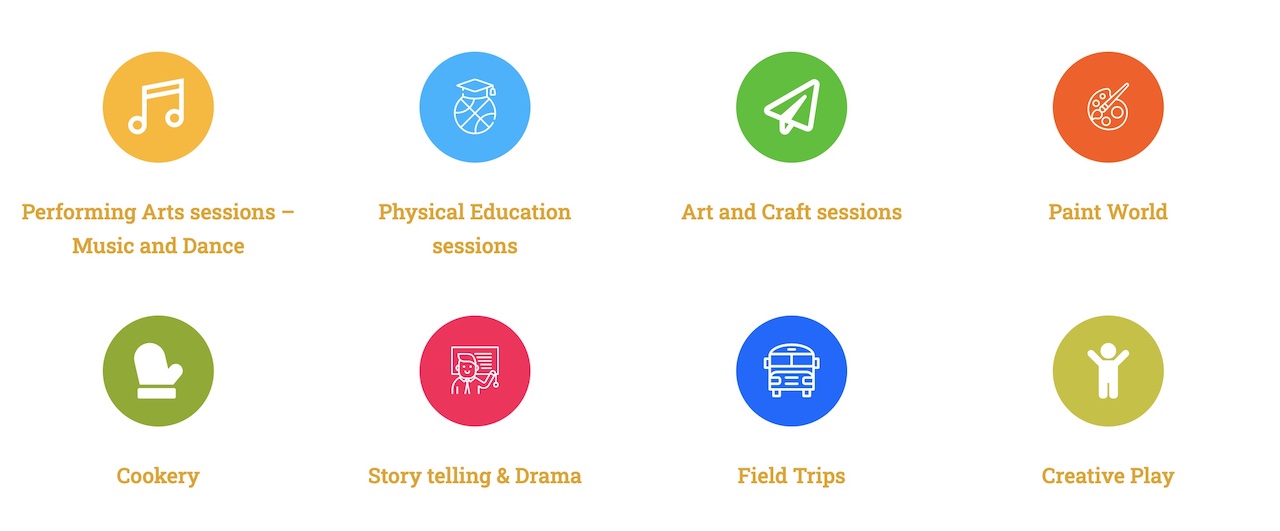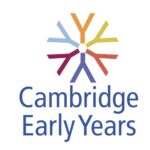WHAT IS EARLY YEARS’ LEARNING?
Early years learning
The Pre-School Learning Curriculum is designed in a progressive manner for three years of preschool education before Class I, for children between the ages of 3–5 years. The document is based on developmentally appropriate approaches and it defines the vital role of preschool teachers and parents in connecting the key concepts and skills, goals, pedagogical processes and practices, and ultimately leading to the achievement of early learning outcomes.
Aims of early years education
- Providing strong foundations for all round development and life-long learning.
- Providing opportunities for developing and nurturing Habits of Mind.
- Preparing the child for school.
Objectives of early years education
- To ensure child-friendly environment where each child is valued, and respected, feels safe, and secure and develops a positive self-concept.
- To enable a sound foundation for good health, well-being, nutrition, healthy habits and hygiene.
- To enable children to become effective communicators and foster both receptive and expressive language.
- To help children become involved learners, think critically, be creative, collaborate, communicate and connect with their immediate environment.
- To enable a smooth transition of children from preschool to primary schools.
- To work as partners with parents and community to enable each child to flourish.
Guiding principles for early years curriculum
In the light of emerging needs and new developments in early years education, an attempt is being made to ensure that the present curriculum is holistic, developmentally appropriate, indigenous, and most importantly play and activity based. Thus, the curriculum is drawn from the following guiding principles:
- Learning is continuous and cumulative
- Each child is different and grows, learns and develops on one’s own pace
- Play and activity are the primary context of learning and development
- Children learn by being provided the environment for experiential learning
- Responsive and supportive interactions with adults are essential to children’s learning
- Mother tongue or home language should be the medium of instruction
- Family involvement contributes to learning
Co-Curricular Activities:

Cambridge Early Years:

The Cambridge Early Years curriculum follows a holistic approach that focuses on the whole child and connects their development with the world and people around them.
It is built around four key areas of early childhood development:

- Develops knowledge, understanding and skills through a spiral approach, by revisiting and engaging with topics and skills in more depth at each stage.
- Helps learners to meet internationally established milestones for early development. Although children develop at different rates, the curriculum provides a structure for teaching and learning that will help you to monitor and support each child’s progress.
- Supports a bilingual or multilingual approach for learners with a home language other than English, as well as those with different experiences of English prepares learners to easily transition into Cambridge Primary, or the next stage in their education.
- Content is split into six curriculum areas to guide you and support progress.
Why choose Cambridge Early Years:

SKILLS
Cognitive development
Cognitive development is a unique process and is specific to each child. Their memories get stronger, which means they remember more surprising details. They can express themselves in unique and engaging ways. Their imaginations are increasingly being used to play and study. Keeping their cognitive development in mind, the activities we frame help them to compare and contrast, organise, evaluate, and brainstorm new solutions to issues.
Language and literacy knowledge are embedded in our nursery classes through a lot of activities like listening to stories, playing listening games, etc. Children start listening to sounds through rhymes, songs from Jolly Phonics, learn to recognise letters and trace them. Children’s vocabulary is improved through individual or group activities where they get to see and work with picture cards, word cards, and real-life objects.
MATH
The objectives under the mathematical skills are as follows
- Preparation of a mathematical mind
- Mathematical relationship
- Relative size, weight and volume are developed.
Students learn numbers through sand paper tracing, counting with manipulatives and shapes.
“Every child is an artist. The problem is how to remain an artist once he grows up.” – Pablo Picasso
For very young children, making art is a sensory exploration activity. Exploring materials is very important because, through exploration, children build a knowledge of the objects in the world around them. Children craft their own projects using simple items they are familiar with in a step-by-step manner. All materials will be provided by the school. Our Art and Craft curriculum includes activities that will help children develop their cognitive, social, and motor abilities.
Students will be exposed to a number of activities such as stretching exercises, fun games, yoga and free play in addition to the indoor games and that will develop motor skills, which may later be applied in various physical activities within and beyond the school setting. They will become aware of a number of positive leisure-time pursuits.
Free play involves human movement in relation to the physical environment. Students are exposed to play in various play areas which helps in developing gross motor skills. Outdoor play offers students the opportunity to discover the capabilities of their bodies and the variety of ways in which they are able to use themselves in a range of situations.
Music, dance and drama is a form of expression that is inherent in all cultures. They are a powerful means to assist in the holistic development of the child, and are important for interpreting and understanding the world. This promotes imagination, communication, creativity, social development and original thinking.
Learning should let children know about the real world. In order to achieve that we in TIPS follow theme based learning. Here children are introduced to general themes like Fruits, Vegetables, Flowers, Trees, Domestic animals, Wild Animals, water animals, etc. Theme based learning involves strategies which will help children in developing their communication skills too.
NON-FLAME COOKING
Cooking in the early years is a great experience for children. Children love to role play and explore what the elders in the house do as they feel empowered. This goes a long way in building confidence for them. However, this can be done in a systematic and planned manner so that children learn and have fun under a safe and supervised atmosphere. Cooking has lots of benefits beyond the obvious. It involves development of all the five sense organs. Cooking strengthens mathematical concepts such as shapes, sizes, measures etc. It also promotes aesthetic sense as they present the food cooked by them. Most importantly, cooking highlights the concept of healthy and unhealthy eating which is the need of the hour. . At school children are encouraged to prepare simple yet nutritious dishes and the same is given as a take-away home so that parents get an idea of what is taught in the cookery class.

